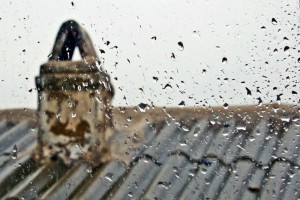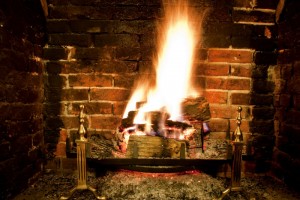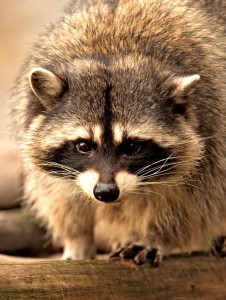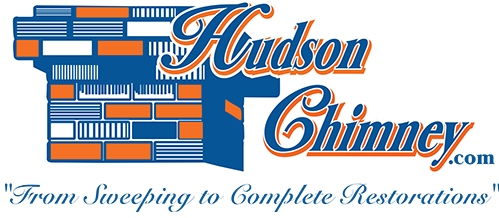by Mark Hudson | Jun 20, 2017 | chimney maintenance
This is a world where everything is low-maintenance, high-speed, made-to-order, and convenient. Due to this, it can be difficult to slow down and add to the list of to-do’s. The weather warms up and you’re finished with your spring cleaning. So, of course you don’t want to think of more work that needs to be done. It can be easy to put off your annual chimney maintenance until winter. However, there’s no good reason to put it off, and every reason to do it now!
Sweeps and Inspections Keep You Safe
Both the Chimney Safety Institute of America (CSIA) and the National Fire Protection Association (NFPA) recommend annual maintenance for the safest and most efficient chimney system. These appointments are the only time a certified professional will get a look at your chimney. Early detection is the key to fixing an issue or weakness in your chimney system. Any weakness can cause catastrophic damage, illness, injury, or death!
It’s Required
Most homeowners insurance policy agreements require routine chimney sweeps and inspections to maintain coverage. A chimney inspection is also required when a property is sold or transferred. Also, when changes are made to the system, or following a natural disaster or fire. The signature of a CSIA Certified Chimney Sweep (CCS) will be recognized and accepted by insurance, real estate, and municipal officials!
Avoid Odors, Damage, and Illness
Did you know a dirty chimney and fireplace can lead to foul odors in the summertime? Soot and creosote left in a chimney can lead to a smoky/barbecue smell. It permeates the home, especially once summer humidity mingles with the residue inside the flue. Odors of decomposing leaves, sticks, debris, and even animal droppings and dead animals themselves can also lead to foul, pungent odors in the chimney. These odors are avoidable when you schedule a chimney sweep following burn season.
Do you leave the filth inside the chimney? If so, the negative pressure of the home will lead to odors, despite any attempt to stop it. What is the most serious odor that can come from a dirty or neglected chimney? The moldy/mildew-like odor that means you have a leaky chimney. Your leak would have been diagnosed early, and repairs completed if it was inspected. Haven’t scheduled your chimney inspection and your chimney smells moldy? Call now, and avoid respiratory issues and water damage!
Avoid the Fall Rush by Scheduling Now
By scheduling your chimney maintenance now, you can avoid the fall rush. This is the time between October and January when chimney sweeps are most busy. At this time it can be hard to get your desired appointment time, your usual technician, and you may even be left in the cold waiting for your service appointment. Schedule your chimney sweep and inspection now and you will have time to make necessary repairs, upgrades, and installations before the fall!
Hudson Chimney is Jacksonville’s #1 chimney sweep company for over 30 years, and we put our customers first every time. To find out about our chimney sweep services and inspections, contact Hudson Chimney today.
by Mark Hudson | Apr 7, 2016 | Chimney Liner, chimney maintenance
If you have an older masonry chimney, you most likely have a clay tile liner. While these liners are durable and long-lasting, the clay tiles do crack and break off over the years. Repairing clay tile liners can be costly and time-consuming, but, fortunately, there is another alternative. Hudson Chimney is proud to offer the HeatShield system to repair and reline clay tile liners. We have been certified by the company that manufactures HeatShield, so you can trust our skills, experience, and training to use this product properly and successfully. We are often asked about this relining system, so we would like to tell you more about HeatShield and how it can restore your chimney liner.

What exactly is HeatShield?
A specially created “Cerfractory” sealant, HeatShield was developed 20 years ago in Europe to restore your chimney to its original level of safety and efficiency. When your clay tile liner is damaged with cracks and gaps, it can be dangerous as these voids allow toxic gases like carbon monoxide to leak back into your home. An environmentally friendly product made from recycled and naturally occurring materials, HeatShield is a less expensive way of relining a chimney, compared to rebuilding your chimney or removing clay tiles to install a new liner.
How does HeatShield repair my clay tile chimney liner?
If Hudson Chimney determines that your liner simply needs repairing, we can use one of two HeatShield methods: the Joint Repair System, if only defective mortar joints are found, or the Resurfacing System, if you have both damaged mortar joints and other minor defects in the tile liner. With the Joint Repair System, we take a special foam applicator blade that has been customized to fit your chimney and place it down your chimney to position it below each gap or void. We then add the HeatShield Cerfractory Flue Sealant mixture to fill in every void. Once the voids have been filled, we will pull the blade upward, which will smooth the repaired voids. The Resurfacing System is very similar, except we will use a customized foam applicator plug. This plug will be placed at the bottom of your flue and attached to a winch at the top of the flue. A primer is applied first, and then we will add the HeatShield mixture. As the plug is pulled up by the winch, the mixture will be smoothed to the right thickness. For both systems, the work will be checked by viewing the footage from the video camera at the bottom of the blade or plug. This ensures the repairs have been done properly.
How can HeatShield replace my liner?
If your clay tile liner is damaged beyond repair, Hudson Chimney can use the CeCure Sleeve Relining System. This process begins with a coat of HeatShield, which is applied with the same type of plug used in the Resurfacing System. Next, the CeCure Sleeve, which is a ceramic insulation sleeve that has been reinforced with stainless steel fabric, will be lowered into your chimney and attached mechanically to the top of the chimney. We then pull the plug down the chimney to press it into the first coat of HeatShield. Finally, another coat of HeatShield will be applied over the CeCure Sleeve. This procedure will also be video recorded and viewed afterwards to be sure the sleeve is in the proper place.
If your clay tile liner needs repairing or replacing, HeatShield can be the perfect solution. Contact us at Hudson Chimney to schedule an inspection of your clay tile liner today.
by Mark Hudson | Dec 13, 2015 | Water Damage And Chimneys
Since your chimney extends from your roof, it is exposed to all of the elements of weather, including rain and snow. While masonry chimneys are built to last the lifetime of a house, this constant exposure to water from rain and melted snow can cause damage and deterioration to a chimney, especially if it is neglected. The Chimney Safety Institute of America (CSIA) claims that water is the biggest enemy of a masonry chimney and recommends regular maintenance to prevent expensive repairs due to water penetration damage and deterioration. Hudson Chimney would like to tell you more about how water damages your chimney and how we can help prevent this damage and deterioration.

How can water damage my chimney?
According to the CSIA, all of the masonry materials that are used to build a chimney can suffer from accelerated damage after being exposed to water for a long period of time. Water causes the bricks and mortar to erode, and during the winter when the temperature drops below freezing, any water that has been absorbed into the bricks and mortar will freeze and expand. When the weather warms up, this water will thaw and cause the masonry materials to crack and break apart. This type of damage is also known as spalling, and if left unrepaired, it can lead to bricks and pieces of mortar falling from the chimney as well as the collapse of the entire structure. If water leaks into a chimney, it can also cause rusting damage to the liner, damper, and other metal components, and it can even damage the interior of your home by staining ceilings and walls.
How can Hudson Chimney protect my chimney from water damage?
Our CSIA-certified chimney technicians have several ways to prevent water penetration of your chimney: chimney caps, flashing, and waterproofing.
Called the least expensive way to prevent water penetration of a chimney, a chimney cap keeps water from even entering into your chimney. We have several different types of caps, and our chimney experts can help you find the perfect cap for your chimney and install the cap to completely cover the opening. Chimney caps have other benefits as well, including keeping birds and animals out of the chimney and preventing hot embers and sparks from jumping out of the chimney to ignite an accidental fire. We also have chimney caps that can help improve the draft in your chimney if you have problems with backdrafting.
Consisting of pieces of metal, flashing wraps around your chimney where it meets the roof to keep water from getting in at that point. In our years of working on chimneys, we have seen inadequate flashing systems that are coming apart and actually let water enter into the chimney. We construct customized flashing systems to completely protect your chimney from water penetration. We also work with state-licensed roofers to ensure the flashing fits correctly along the roof.
Using a 100% vapor permeable formula, our chimney technicians can waterproof your chimney by applying a coat of this formula to your entire chimney. We use ChimneySaver products that are designed especially for chimneys. This formula provides a barrier on your masonry chimney that keeps water from leaking into the bricks and mortar but allows fumes and vapors to easily escape so that they do not become trapped to cause further damage.
Protect your chimney from water damage this winter. Contact us at Hudson Chimney to schedule an appointment for one of our water penetration prevention services.
by Mark Hudson | Nov 28, 2015 | Chimney Sweeping Logs
Have you ever wondered why you need to have your chimney professionally swept annually? Of course, your chimney gets pretty dirty from regular fires in the fireplace, but soot and dust is not the most important reason for this maintenance task. Your chimney should be cleaned professionally once a year to remove the accumulated creosote from the inner walls of the flue. A compound that forms naturally as a result of the combustion process of burning wood, creosote is extremely flammable and is the main cause of chimney fires. It is essential to get all of the creosote out of your chimney so you can enjoy your fireplace without worrying about this fire hazard. You may have seen chimney sweeping logs, a product that claims to remove and reduce creosote from your chimney, and considered that they could be a substitute for a chimney sweeping by one of the Chimney Safety Institute of America (CSIA)-certified chimney professionals from Hudson Chimney. However, this is not the case, and chimney sweeping logs can even lead to dangers in your home. We would like to tell you more about why you should never substitute a professional chimney cleaning by using chimney sweeping logs.

WHAT CHIMNEY SWEEPING LOGS DO
Burning a chimney sweeping log in your fireplace or stove releases chemicals that use catalytic action to remove a portion of accumulated creosote from your chimney. These chemicals cause creosote to flake off and break away from the chimney wall. While this product does remove some of the creosote, the CSIA has its concerns. The claims of chimney sweeping logs are not completely accurate and can lull homeowners into a false sense of security.
THE RISKS OF CHIMNEY SWEEPING LOGS
As we said earlier, creosote is very flammable, so when pieces of creosote are falling down your chimney after flaking off, they could easily catch on fire and lead to a devastating chimney fire. Even if the creosote does not ignite on its way down, the pieces end up at the bottom of your chimney to gather on the smoke shelf and form together to cause yet another fire hazard. Any creosote remaining in your chimney, whether or not it is stuck to the walls of the flue, poses a dangerous fire hazard.
WHY A PROFESSIONAL CHIMNEY SWEEPING IS SO CRUCIAL
Firstly, you can trust our CSIA-certified sweeps at Hudson Chimney to completely remove all of the creosote from your chimney. We know far too well the dangers of creosote, and we take great care to be sure we have gotten all of the accumulated deposits out of your chimney. Not only do we thoroughly clean your chimney, but we also provide a professional inspection with every chimney sweeping. Our sweeps will closely examine the interior and exterior of your chimney to look for any damage that needs to be fixed for your fireplace and chimney to function effectively and safely. If any debris such as nests from birds and animals or leaves are blocking your chimney, we will also remove the blockage to prevent any accidental fires or carbon monoxide leaks.
Have you had your chimney professionally swept this year? Stay away from chimney sweeping logs, and contact us at Hudson Chimney to make an appointment for a safe chimney this winter.
by Mark Hudson | Nov 14, 2015 | Animals in chimney
Hearing strange noises coming from your chimney is a sure sign that birds or other animals like squirrels or raccoons have mistaken your chimney for a tree and moved inside for the winter. If you have a family of birds or animals living inside your chimney, you should never attempt to smoke them out by lighting a fire. This can result in severely burning or killing the animals and creating an even larger problem. Our staff at Hudson Chimney is used to dealing with these critters invading chimneys, and we can safely remove them to allow your fireplace and chimney to be used without problems. We would like to tell you more about how to deal with birds and animals in your chimney by sharing with you some information from Chimneys.com.

BIRDS
Typically, birds will build nests on the smoke shelf or just above the damper, but some types of birds build their nests on the sides of chimney liners. You can even have multiple bird nests inside your chimney at one time. The biggest problem you can have with a bird nest in your chimney is that the nest can block your flue, and this can lead to carbon monoxide being forced back into your home. As nesting materials are highly flammable, there is also the risk of a chimney fire. Birds also carry diseases like histoplasmosis, which can cause blindness. If you have migratory birds such as chimney swifts living in your chimney, it is illegal to have these birds removed. You will have to wait until the late spring when they leave their nests to have these nests taken away from your chimney.
SQUIRRELS
Squirrels build nests by packing them very tightly, which makes them difficult to remove. Hudson Chimney has heard reports of chimney sweeps needing hours to remove nests that were over 15 feet long! Not only do the nests of squirrels block the flue of your chimney, but squirrels themselves can open up the damper and enter your home to cause even more damage.
RACCOONS
If you have a raccoon in your chimney, we strongly recommend that you leave its removal to professionals and do not attempt to get the animal out yourself. Raccoons can be very aggressive and will bite you. They also carry diseases like rabies and roundworm.
HOW DO I KEEP BIRDS AND ANIMALS OUT OF MY CHIMNEY?
The best way to keep these critters from taking up residence in your chimney is to have a good quality chimney cap installed at the top of the chimney. Be sure the cap is equipped with metal mesh siding, and you will also want to choose a cap constructed from copper or stainless steel as birds and animals can tear up caps made from aluminum.
Heard sounds of birds or animals coming from your chimney? Contact us at Hudson Chimney as soon as possible to ask for our help on removing these critters safely.




